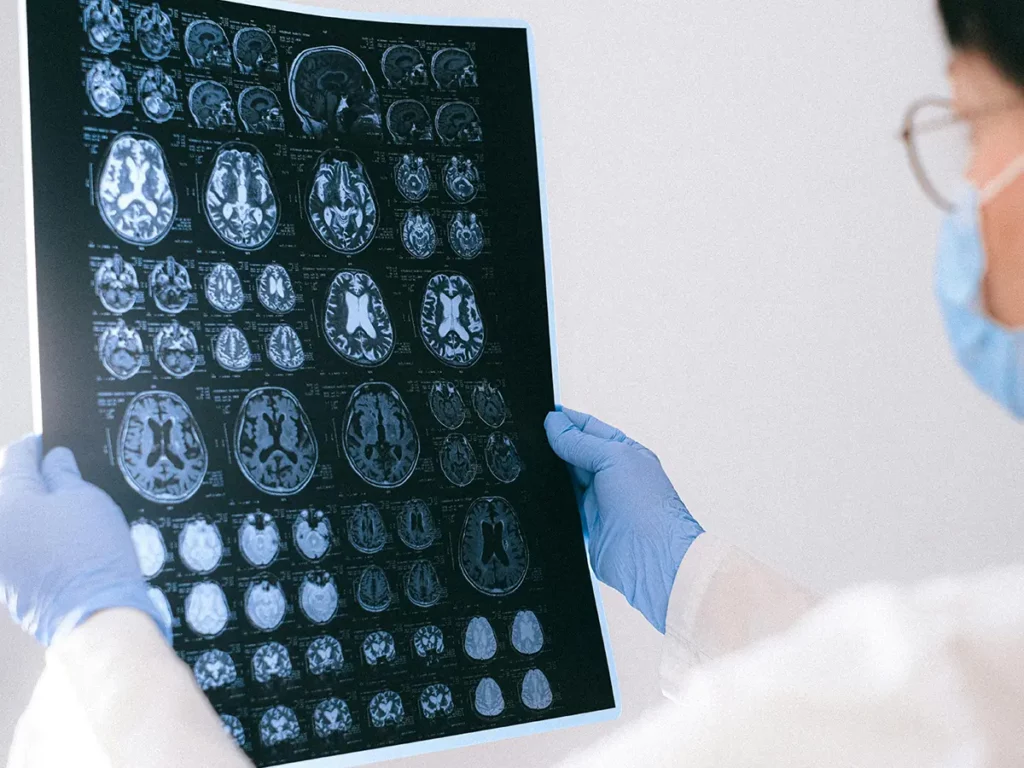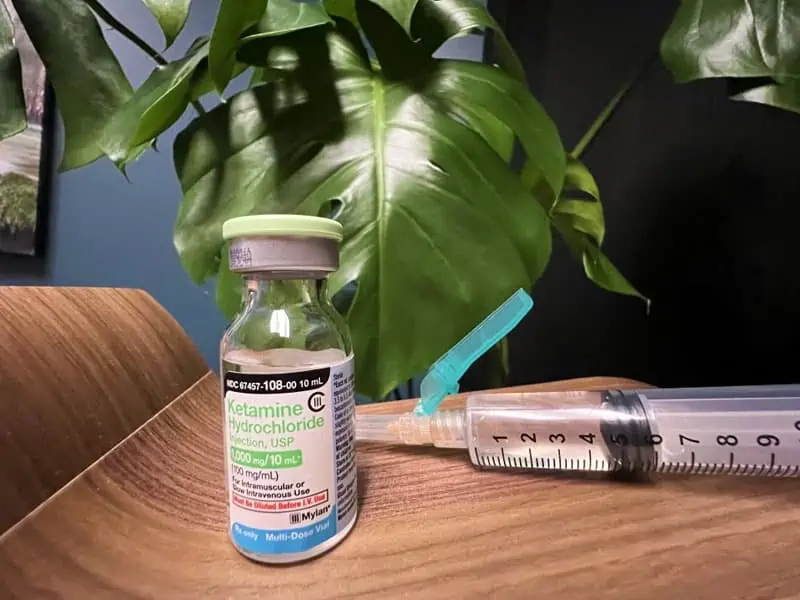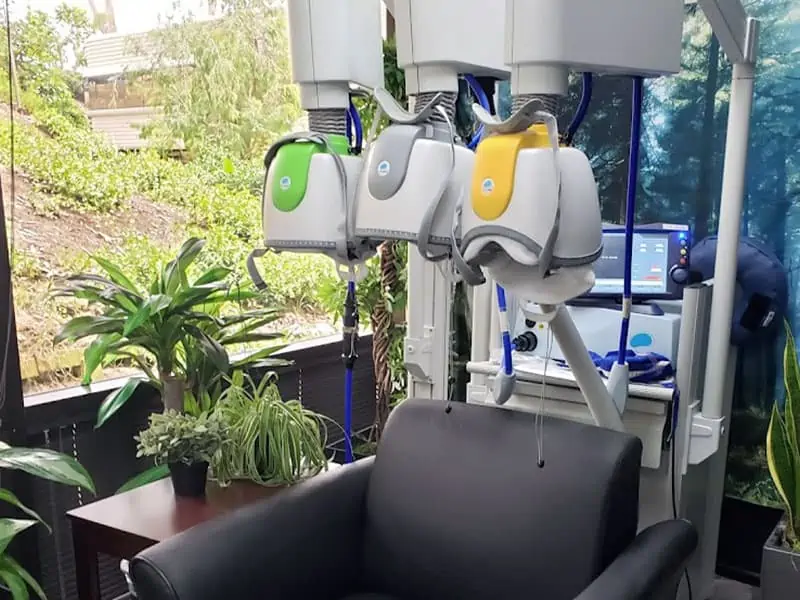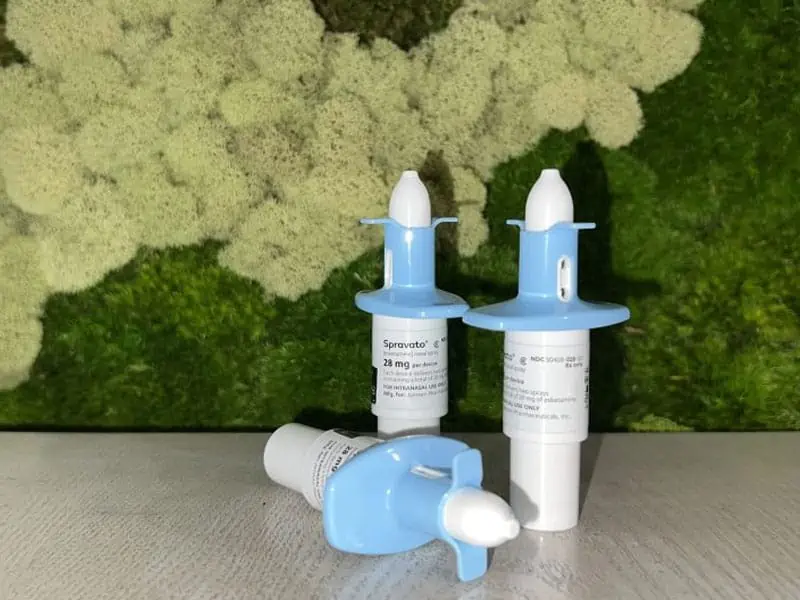Overcoming Trauma : PTSD Treatment Center in San Diego
Kadima is a leading PTSD treatment center in San Diego. We offer advanced treatments for PTSD when traditional therapy falls short.
Home » What We Treat » PTSD Treatment Center San Diego
What is PTSD?
Post Traumatic Stress Disorder (PTSD) is a serious mental health condition impacting emotions, thoughts, and behaviors. Affected brain areas may include areas crucial for processing fear, forming memories and regulating emotions.
According to the U.S National Center for PTSD, 13 million American adults, or about 5% of the U.S. population experienced PTSD in 2020.
How do you get PTSD?
PTSD can be caused by experiencing a traumatic event, whether directly or through repeated exposure to the details of others’ experiences (Secondary traumatic experience). However, the development of PTSD is more complex than simply encountering trauma.
Individual factors like genetic predisposition, existing mental health conditions, personality traits, and social support systems all play a role in determining vulnerability.
If symptoms like flashbacks, nightmares, avoidance behaviors, and hypervigilance become chronic and significantly disrupt daily life, a diagnosis of PTSD might be considered by a mental health professional.

Signs and Symptoms of PTSD
The signs and symptoms of PTSD can vary from mild to severe and can include:
Intrusive Thoughts and Memories:
- Recurrent, distressing memories or dreams related to the traumatic event.
- Flashbacks, where the individual feels as though the trauma is happening again.
Avoidance:
- Efforts to avoid thoughts, feelings, or conversations associated with the traumatic event.
- Avoidance of people, places, or activities that serve as reminders of the trauma.
Negative Changes in Mood and Thinking:
- Persistent negative beliefs or expectations about oneself, others, or the world.
- Feelings of detachment, estrangement from others, or a reduced interest in activities once enjoyed.
Arousal and Reactivity:
- Persistent heightened state of alertness or arousal (hyperarousal).
- Irritability, aggression, self-destructive behavior, or difficulty sleeping.
Intrusive Thoughts and Memories:
- Recurrent, distressing memories or dreams related to the traumatic event.
- Flashbacks, where the individual feels as though the trauma is happening again.
Avoidance:
- Efforts to avoid thoughts, feelings, or conversations associated with the traumatic event.
- Avoidance of people, places, or activities that serve as reminders of the trauma.
Negative Changes in Mood and Thinking:
- Persistent negative beliefs or expectations about oneself, others, or the world.
- Feelings of detachment, estrangement from others, or a reduced interest in activities once enjoyed.
Arousal and Reactivity:
- Persistent heightened state of alertness or arousal (hyperarousal).
- Irritability, aggression, self-destructive behavior, or difficulty sleeping.
For a diagnosis of PTSD according to the DSM-V, symptoms must persist for at least a month and significantly disrupt daily life. These symptoms can also include changes in cognitive and emotional processing, ultimately impacting a person’s overall quality of life.
Combat PTSD and San Diego Veterans
Post-Traumatic Stress Disorder (PTSD) among U.S. veterans, particularly those who have experienced combat, is a complex and pervasive issue with distinct characteristics.
The U.S. Department of Veterans Affairs emphasizes that combat veterans often face challenges transitioning back to civilian life due to the intense and prolonged nature of their traumatic experiences. Understanding the differences between the nature of combat trauma and other types of trauma is crucial to tailor a successful treatment plan for PTSD in veterans.

Dr. David Feifel, the founder of Kadima, brings over 30 years of experience supporting San Diego veterans.
His expertise in addressing trauma associated with military service has helped hundreds of San Diego veterans to reclaim their well-being and reintegrate into civilian life. To learn more about his work with veterans, read this USA Today article.
Start your personalized path to mental wellness with a one-on-one consultation with Dr. Feifel at Kadima. Schedule yours today!
Finding Hope: Exploring Innovative PTSD Treatment Options at Kadima
Traditional treatments like medications, trauma-focused cognitive behavioral therapy (CBT) and eye movement desensitization and reprocessing (EMDR) have proven effective for some people. However, a large percentage of individuals with PTSD do not find significant relief with these conventional methods or the benefits may be temporary.
Driven by the need for innovative solutions, Kadima actively pursues cutting-edge, evidence-based approaches to treat PTSD. Two such treatments are Ketamine therapy and TMS therapy.
Unveiling the Power of Ketamine Therapy for PTSD
We offer ketamine therapy for PTSD, a potential treatment option using ketamine infusions administered under the supervision of our experienced physicians. Ketamine therapy is thought to work by modulating the brain’s glutamate system, potentially promoting neuroplasticity and reducing symptom severity.
While not formerly an FDA approved treatment for PTSD, scientific evidence including randomized clinical trials, support ketamine as safe and effective treatment for PTSD. For example, in a study published in the prestigious JAMA psychiatry journal, subjects with PTSD were given six infusions of ketamine while another set of subjects were given midazolam. This study found that ketamine was significantly more effective than midozlam in achieving rapid reduction of PTSD symptom severity (Feder et al., 2014).
While still considered an investigational treatment for PTSD, it offers hope for individuals who haven’t found relief through traditional therapies.
Exploring TMS Therapy for PTSD
Transcranial Magnetic Stimulation (TMS) therapy for PTSD is a non-invasive treatment utilizing focused magnetic pulses to stimulate brain regions linked to emotional processing in PTSD patients.
Our San Diego clinic utilizes Brainsway’s Deep TMS system, a top-of-the-line technology recognized for its effectiveness in delivering TMS therapy compared to other TMS devices.
While the treatment of core symptoms of PTSD with TMS is still under development, TMS therapy is FDA approved to treat depression and anxiety, conditions that people with PTSD frequently struggle with.
Learn More about These Groundbreaking Treatments:
Research at the Forefront of PTSD Treatments
MDMA Therapy for PTSD
MDMA-assisted psychotherapy holds promise as a novel treatment for PTSD. A recent phase 3 trial (Mithoefer et al., 2023) demonstrated significant reductions in PTSD symptoms compared to a placebo with therapy. Notably, the study found that 71% of participants who received MDMA-assisted therapy no longer met criteria for PTSD at its conclusion. Researchers believe that MDMA’s effects may stem from its ability to enhance feelings of empathy and trust, potentially facilitating the processing of traumatic memories within a therapeutic setting (Pascual-Leone-Martinez et al., 2021). While MDMA remains under investigation and is not currently an approved treatment for PTSD, these findings fuel optimism for the future of PTSD treatment with MDMA. In anticipation of potential FDA approval, Kadima has a team of therapists trained in MDMA-assisted psychotherapy.
Complex PTSD (C-PTSD): Tailored Treatment for Deeper Scars
For some individuals, the trauma goes beyond a single event, leaving deeper scars. Complex PTSD (C-PTSD) arises from prolonged or repeated exposure to overwhelming stress, often in childhood. C-PTSD shares a close connection with traditional PTSD but may present additional symptoms, more enduring and extreme than those of PTSD.
Recognizing the unique challenges of C-PTSD, Kadima provides specialized treatment plans that address the complex emotional and psychological needs of individuals struggling with this condition.
What makes Kadima different from other PTSD treatment centers?
Kadima Neuropsychiatry sets itself apart in several key ways:
- Cutting-edge treatment options: We are at the forefront of offering innovative therapies like Ketamine & TMS Therapy, providing hope for those who haven’t found relief with traditional methods.
- Specialized C-PTSD treatment: We recognize the unique complexities of C-PTSD and offer tailored treatment plans to address its specific needs.
- Expert team: Our team comprises highly qualified and experienced professionals, including psychiatrists, licensed therapists, and specialists in trauma-informed care.
- Compassionate and personalized care: We understand the sensitive nature of trauma and approach each individual with empathy and respect, tailoring treatment plans to their unique needs and goals.
- Focus on San Diego community: We are deeply committed to serving the San Diego community and its veterans, offering accessible and affordable treatment options.
Embracing Life Again: Testimonies of Transformation at Kadima
The stories of transformation at Kadima are testaments to the power of personalized, evidence-based PTSD treatment. Witnessing individuals regain their lives after years of struggle fuels our dedication to providing the highest quality care. Through their courage and determination, alongside the expertise of our dedicated team, our patients found a path for healing. Here are some of their stories:
Frequently Asked Questions about PTSD Treatment at Kadima
What is the best treatment for PTSD?
How many veterans with PTSD seek treatment?
Is PTSD Curable?
What is EMDR therapy for PTSD?
What does PTSD mean?
Do I have PTSD?
Take the First Step Towards Healing
Living with PTSD can be isolating and overwhelming, but you are not alone. we are here to support you on your journey towards healing and reclaiming your life.
Take the first step towards a brighter future and contact us today for a confidential consultation.
Leave your details and we will contact you:
Where can I find more information about PTSD?
We encourage you to explore the following resources for additional information and support:
References
- Mithoefer, M. C., Mithoefer, A. T., Wagner, M. T., Buchanan, T., Moreno, F. A., & Lyddane, M. (2023). 3,4-Methylenedioxymethamphetamine (MDMA)-assisted psychotherapy for treatment-resistant post-traumatic stress disorder: Results of a randomized, double-blind, controlled phase 3 study. Nature Medicine, 29(7), 1134-1142. [invalid URL removed]
- Pascual-Leone-Martinez, I., Moreno, F. A., Celia-Terrassa, J., Liebregts, R., Diaz-Marsa, M., Clo pretreatment with MDMA for psychotherapy in PTSD. Frontiers in Psychiatry, 12, 1014. [invalid URL removed]
- Feder, A., Parides, M. K., Murrough, J. W., Perez, A. M., Morgan, J. E., Saxena, S., Kirkwood, K., Aan Het Rot, M., Lapidus, K. A., Wan, L. B., Iosifescu, D., & Charney, D. S. (2014). Efficacy of intravenous ketamine for treatment of chronic posttraumatic stress disorder: a randomized clinical trial. JAMA psychiatry, 71(6), 681–688. https://doi.org/10.1001/jamapsychiatry.2014.62




